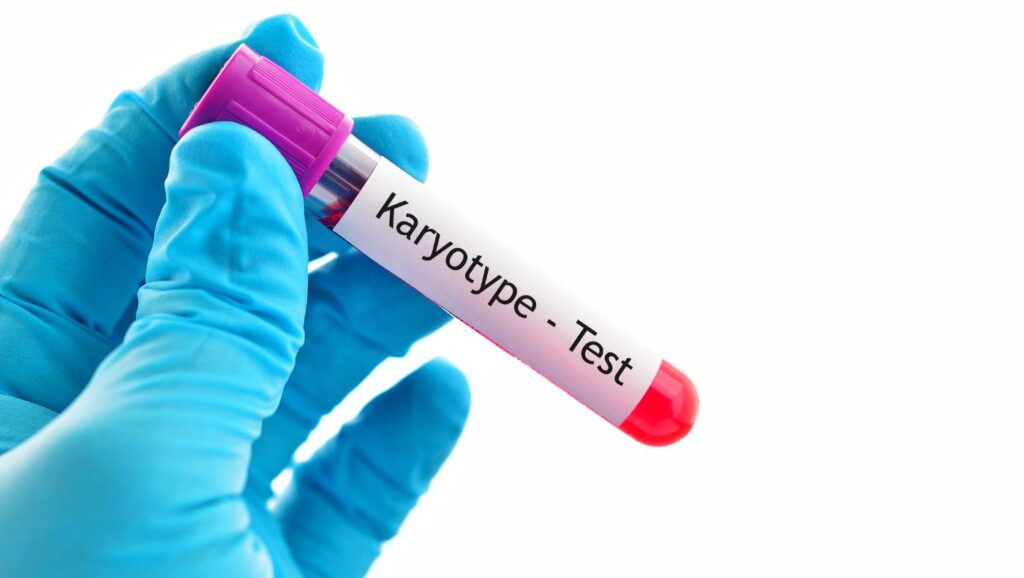
Introduction
A proper diagnosis of infertility requires accurate cause identification to receive appropriate medical treatment. In reproductive medicine, the Karyotype Test for Infertility proves critical among all diagnostic tools. Medical personnel use chromosomal abnormalities detected through genetic tests to identify infertility origins and other reproductive issues such as miscarriages and unsuccessful in vitro fertilization attempts.
What is a Karyotype Test?
To determine chromosome composition the karyotype test performs laboratory verification of chromosome count as it measures size and shape. The genetic content within cells exists inside chromosomes which hold essential data for cellular growth as well as reproductive functions. A genetic disorder or fertility condition develops due to any type of change within chromosome structure or number.
Why is a Karyotype Test Important for Infertility?
Testing for the Karyotype during infertility evaluation reveals genetic reasons which cause conception problems and recurrent pregnancy loss or failed assisted reproductive therapies. The test enables detection of several conditions in combination:
- Chromosomal Translocations – Medical chromosomal translocation creates fertility problems that result in regular pregnancy losses throughout the pregnancy period.
- Aneuploidy – Sexual problems exist in people who have Turner syndrome (45,X) and Klinefelter syndrome (47,XXY) because these conditions cause chromosomal abnormality.
- Mosaicism – The human reproductive health faces problems because the phenomenon of mosaicism exists where different cells carry separate genetic compositions.
- Y Chromosome Microdeletions – Persons with Y Chromosome Microdeletions experience either decreased sperm production or complete sperm production absence (azoospermia).
Who Should Consider a Karyotype Test?
Medical professionals receive Karyotype Test for Infertility results which enable them to create specialized fertility therapies for their patients:
- Genetic counseling sessions occur after discovering abnormalities in patients to explain available reproductive options.
- PGT represents a procedure which helps couples undergoing IVF treatment to screen embryos for chromosomal abnormalities to enhance their implantation success.
- Genetic issues that experts cannot treat allow unmarried couples to seek pregnancy by using either donor sperm or donor eggs.
- A genetically tailored approach in IVF therapy protocols creates more successful outcomes for reproductive medical interventions.
How is a Karyotype Test Performed?
The karyotype test is a simple blood test that requires a sample from one or both partners. The steps involved include:
- Blood Sample Collection – The medical procedure requires technicians to extract a small amount of blood through venous access.
- Cell Culture and Analysis – The laboratory conducts cell culture and analysis of sampled cells to observe chromosomes through microscopic examination.
- Results Interpretation – The doctor analyzes the patient’s chromosomal arrangement structure to determine abnormalities during the evaluation.
How Does the Karyotype Test Help in Fertility Treatment?
Medical personnel use Karyotype Test for Infertility results to develop individualized fertility treatments for their patients:
- Medical examinations detecting abnormal genes require genetic counselors to provide patients with information about their reproductive choices.
- During Preimplantation Genetic Testing (PGT) couples who use IVF treatment can check embryos for chromosomal problems which boosts their embryo implantation probability.
- The use of donor sperm or eggs allows the partner who has an untreatable genetic issue to achieve pregnancy.
- Reproductive treatment processes achieve better outcomes through genetic-specific IVF protocols developed for individual patients.
Conclusion
The Karyotype Test for Infertility helps medical professionals identify genetic causes of infertility while determining appropriate treatment options for childbearing. Early detection of chromosomal abnormalities through testing helps couples make knowledgeable decisions about their reproductive path while finding suitable pregnancy achievement options
Unlock answers about your fertility path through booking a Karyotype Test at Ovum Fertility.
FAQs
1. How long does it take to get karyotype test results?
Karyotype test results require one to three weeks for completion by the laboratory while they process sample materials.
2. Is the karyotype test painful?
Medical facilities execute this test through blood-drawing procedures, which yield results similar to normal blood tests.
3. Can a karyotype test detect all genetic issues related to infertility?
The test reveals major chromosomal abnormalities, yet it fails to show all genetic mutations and small-scale genetic disorders.
4. What should I do if my karyotype test results show abnormalities?
A fertility specialist or genetic counselor must help you choose the right treatment and reproductive planning based on your test results.
5. Is the karyotype test necessary for all infertility cases?
Not always. Healthcare providers recommend karyotyping to couples with regrettably lost pregnancies, people experiencing IVF treatment failures, and those whose families have hereditary disease histories.